教案IntegratedskillsandStudyskills
Unit1 Integrated skills and Study skills导学案(英语教案)
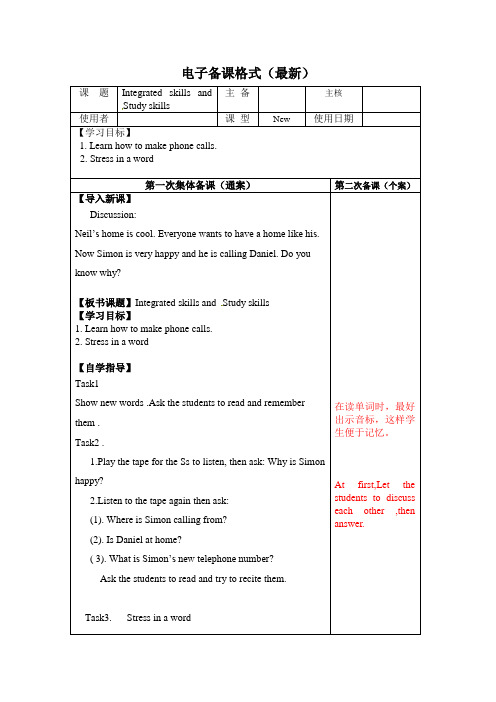
电子备课格式(最新)课题Integrated skills andStudy skills主备主核使用者课型New 使用日期【学习目标】1. Learn how to make phone calls.2. Stress in a word第一次集体备课(通案)第二次备课(个案)【导入新课】Discussion:Neil’s home is cool. Everyone wants to have a home like his.Now Simon is very happy and he is calling Daniel. Do youknow why?[【板书课题】Integrated skills and Study skills【学习目标】1. Learn how to make phone calls.2. Stress in a word【自学指导】Task1Show new words .Ask the students to read and remember them .学Task2 .网]1.Play the tape for the Ss to listen, then ask: Why is Simon happy?2.Listen to the tape again then ask:(1). Where is Simon calling from?(2). Is Daniel at home?( 3). What is Simon’s new telephone number?Ask the students to read and try to recite them.Task3. Stress in a word 在读单词时,最好出示音标,这样学生便于记忆。
At first,Let the students to discuss each other ,then answer.When we pronounce words with more than one syllable, we stress one of the syllables.重读的音节声音听起来更响亮些。
Unit2 Integrated skills and study skills精品教案
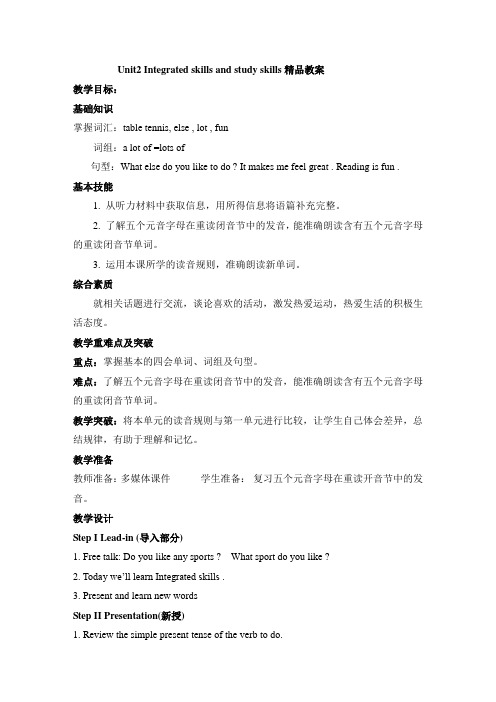
Unit2 Integrated skills and study skills精品教案教学目标:基础知识掌握词汇:table tennis, else , lot , fun词组:a lot of =lots of句型:What else do you like to do ? It makes me feel great . Reading is fun .基本技能1. 从听力材料中获取信息,用所得信息将语篇补充完整。
2. 了解五个元音字母在重读闭音节中的发音,能准确朗读含有五个元音字母的重读闭音节单词。
3. 运用本课所学的读音规则,准确朗读新单词。
综合素质就相关话题进行交流,谈论喜欢的活动,激发热爱运动,热爱生活的积极生活态度。
教学重难点及突破重点:掌握基本的四会单词、词组及句型。
难点:了解五个元音字母在重读闭音节中的发音,能准确朗读含有五个元音字母的重读闭音节单词。
教学突破:将本单元的读音规则与第一单元进行比较,让学生自己体会差异,总结规律,有助于理解和记忆。
教学准备教师准备:多媒体课件学生准备:复习五个元音字母在重读开音节中的发音。
教学设计Step I Lead-in (导入部分)1. Free talk: Do you like any sports ? What sport do you like ?2. Today we’ll learn Integrated skills .3. Present and learn new wordsStep II Presentation(新授)1. Review the simple present tense of the verb to do.Do you like sports ? Does he like sports ? What sport do you like best ? What sport does he/ she like best ? Do you often play football / volleyball / tennis? Does he/ she often play football / volley / tennis ?2. Listening.Listen and finish Part A1. Mr. Wu is asking his students about their favourite sports . Can you help Mr. Wu write the correct letters in the boxes ?3. Work in pairs and talk about what sports the students like4. Listen again and finish Part A 25. Read the notes in Part A 26. Ask and answer about what sports the students like .Step III Present Speak up(新授Speak up)1.Lead-inI often play football after school. Do you often play football after school ?What do you often do after school ?2. Work in pairs3. Now Sandy and Millie are talking about what they often do after school .Listen and answer : What does Sandy do after school ? What about Millie ?4. Read after the tapeNotes : What else do you like to do ? =What other things do you like to do ?It makes me feel great . make us laugh / make me happya lot of =lots of Reading is fun .5. Work in pairs and talk about your after-school activities .StepⅣLearn Study Skills (学习Study skills)1. Revision : Read the following words :cake face ,lake , name / ei / these he , me, we / i:/time , rice , kite , wife / ai/ no, joke , note , nose / əu/music , use , pupil , computer / ju:/Review the sounds of the five vowel letters in Unit 12. Presentation : Read the following words :cat , bat , man / æ / pen , bed ,red / e /。
7A Unit 1 Intergrated skill&study skills (2)教案
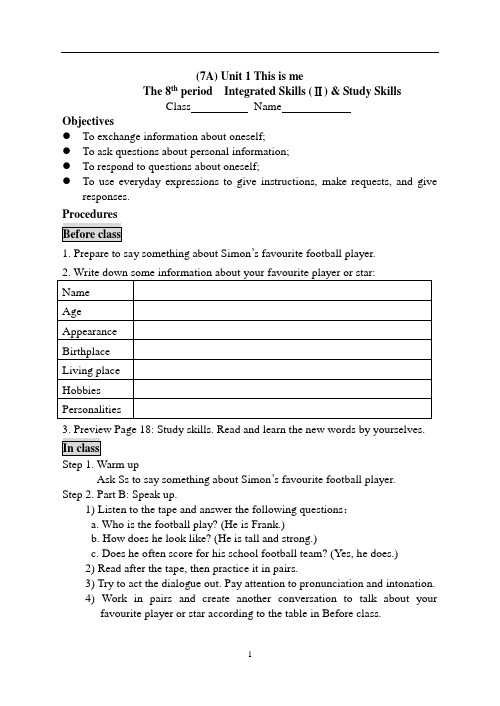
(7A) Unit 1 This is meThe 8th period Integrated Skills (Ⅱ) & Study SkillsClass NameObjectives●To exchange information about oneself;●To ask questions about personal information;●To respond to questions about oneself;●To use everyday expressions to give instructions, make requests, and giveresponses.Procedures1. Prepare to say something about Simon’s favourite football player.3. Preview Page 18: Study skills. Read and learn the new words by yourselves.Step 1. Warm upAsk Ss to say something about Simon’s favourite football player.Step 2. Part B: Speak up.1) Listen to the tape and answer the following questions:a. Who is the football play? (He is Frank.)b. How does he look like? (He is tall and strong.)c. Does he often score for his school football team? (Yes, he does.)2) Read after the tape, then practice it in pairs.3) Try to act the dialogue out. Pay attention to pronunciation and intonation.4) Work in pairs and create another conversation to talk about yourfavourite player or star according to the table in Before class.5) Role-play the new conversation in front of the classStep 3. Study skills1)Today we will learn some useful expressions in English. Open yourbooks and turn to Page 18. Where is my book? I can’t find it. (Pretend to borrow a book from a student)T: Excuse me. Do you have a book?S: Yes, I do./ No, I don’t.T: Can I borrow your book?S: Yes, you can./ Yes, here you are./ I’m sorry. I don’t have one.2) Make similar dialogues under different situations with your partners:If you don’t know how to say something in English, you sayIf you don’t understand something, you sayIf you don’t know the answer to something, you sayIf you want to start a role-play, you say3) Practice.1. Match A to B.( ) 1. How do you do? A. Yes, I am.( ) 2. How do you say that in English? B. My name’s Hobo.( ) 3. What’s your name? C. Yes, he always does. ( ) 4. Are you his master? D. No, she isn’t.( ) 5. How old is Sandy? E. How do you do?( ) 6. Does Simon play tennis after school? F. Sorry, I don’t know. ( ) 7. Is she your friend? G. She is twelve.( ) 8. Where do you live? H. No, I don’t.( ) 9. Do you have a rubber? I. OK. Let’s go.( ) 10. Can I borrow your ruler? J. Me too. It’s a nice school ( ) 11. Let’s go to school together. K. I live in Summer School. ( ) 12. I like my new school. L. I’m sorry. I don’t have one.2. Say the sentences in another way.1) The young man is a player of Huanghe Team.The young man Huanghe Team.2) It’s time for bed.It’s time .3) Is he from England?he England?4) Do you walk home?Do you ?5) He has glasses on his nose.He .3. Put the following sentences into English.1) ---这个用英语怎么说?---对不起,我不知道。
牛津译林版英语九年级下册Unit1IntegratedSkillsStudySkills教学设计

在导入新课的环节,我将采用头脑风暴的活动方式,引发学生对学习方法和策略的思考。首先,我会向学生提问:“How do you usually study English?”,让学生分享自己在英语学习中的经验和技巧。接着,我会邀请几位学生上台,用思维导图的形式展示他们的学习方法。通过这一过程,学生可以意识到学习策略的重要性,并为接下来的新课学习做好心理准备。
-自主学习与合作学习的平衡:学生需要在自主学习中培养独立思考的能力,同时在与同伴的合作中提高沟通和协作能力。
(二)教学设想
1.教学方法:
-采用任务型教学法,设计富有挑战性和实践性的学习任务,引导学生主动探究和合作学习。
-运用情景教学法,创设贴近学生生活的语境,让学生在实际语境中练习语言知识。
-结合信息技术,利用多媒体和互联网资源,提高学生的学习兴趣和效率。
2.技能目标:培养学生运用所学知识进行有效的学习策略制定,提高学生的英语学习效率。通过课堂活动,提高学生的听说读写综合能力,特别是在听说环节中,使学生能够熟练运用过去时态进行交流。
(二)过程与方法
1.过程目标:通过小组合作、讨论、分享等课堂活动,使学生体验和感悟学习策略的运用,培养学生自主学习、合作学习的意识。
在教学过程中,教师应关注学生的个体差异,给予每个学生充分的关爱和指导,使他们在原有基础上得到提高。注重培养学生的思维品质和人文素养,使他们在英语学习中获得全面的发展。
二、学情分析
牛津译林版英语九年级下册Unit1的Integrated Skills和Study Skills部分,旨在帮助学生巩固所学知识,提高学习效率。考虑到九年级学生的年龄特点和认知水平,他们在学习过程中表现出以下特点:
4.学习兴趣:学生对新颖、有趣的学习活动表现出较高的兴趣,教师可结合这一特点,设计富有创意的教学环节,激发学生的学习兴趣。
unit4 Integrated skills and study skills教案
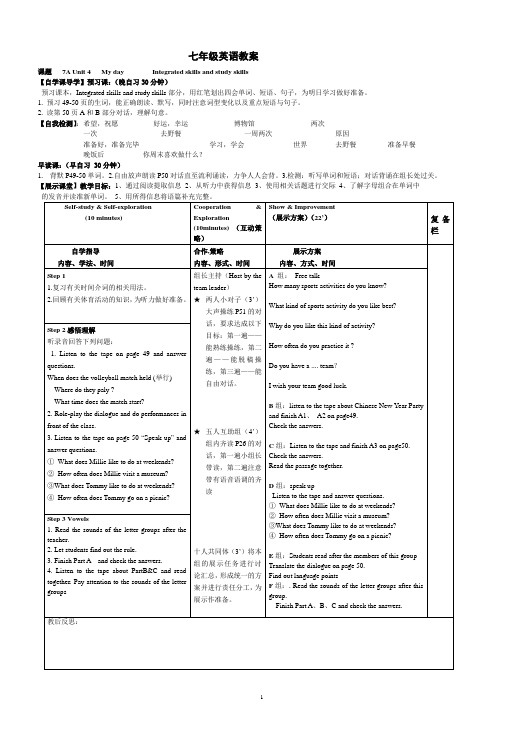
七年级英语教案课题7A Unit 4 My day Integrated skills and study skills【自学课导学】预习课:(晚自习30分钟)预习课本,Integrated skills and study skills部分,用红笔划出四会单词、短语、句子,为明日学习做好准备。
1. 预习49-50页的生词,能正确朗读、默写,同时注意词型变化以及重点短语与句子。
2. 读第50页A和B部分对话,理解句意。
【自我检测】:希望,祝愿_________ 好运,幸运____________ 博物馆_______________ 两次________一次_________________ 去野餐__________________一周两次_________________原因____________准备好,准备完毕____________________学习,学会______________世界_______ 去野餐________ 准备早餐_______晚饭后_________ 你周末喜欢做什么?____________________早读课:(早自习 30分钟)1.背默P49-50单词。
2.自由放声朗读P50对话直至流利诵读,力争人人会背。
3.检测:听写单词和短语;对话背诵在组长处过关。
【展示课堂】教学目标:1、通过阅读提取信息2、从听力中获得信息3、使用相关话题进行交际4、了解字母组合在单词中的发音并读准新单词。
5、用所得信息将语篇补充完整。
Self-study & Self-exploration(10 minutes) Cooperation &Exploration(10minutes) (互动策略)Show & Improvement(展示方案)(22’)复备栏自学指导内容、学法、时间合作,策略内容、形式、时间展示方案内容、方式、时间Step 11.复习有关时间介词的相关用法。
译林版七年级英语上册 Unit5 Integrated+skills +studyskills.讲义

教学内容7A Unit 5 Integrated skills and study skills.教学目标 1. 认识英语中的部分元音字母组合的发音:能正确读出这些音素。
2. 重点词汇、短语1. 认识英语中的部分元音字母组合的发音:能正确读出这些音素。
重点2. 重点词汇、短语难点正确运用所学词汇、短语完成相关练习。
教学准备知识点、巩固练习、课堂练习、课后作业教学过程1.find out发现eg: That’s a good question. Let me find out the answer for you.那是一个好问题,让我来为你找出答案吧。
考向:look for, find与find out词条含义look for 意为“寻找”,强调动作。
find 意为“找到”,强调结果,宾语往往是某个丢失的东西或人。
find out 意为“查明真相,弄清缘由”,强调经过理解、分析、思考、调查等“弄清楚”、“查明”一件事情。
【一语辩异】I looked for it everyday but I couldn’t find it.我到处找它,但我找不到他它。
2.more pron&det. 更多(的)eg: You’d better eat more vegetables.你最好多吃蔬菜。
考向:more除了作为many和much的比较级,表示“更多的”的意思外,还有“附加的,另外的”的意思。
eg:Could you give me two more pieces of papers?你能在给我两张纸吗?Have some more tea, please.请再喝点茶吧。
3.radio n.无线电广播(节目),收音机eg: I listen to the radio on my way to work.我在上班的路上听广播。
【拓展】on the radio在广播里eg: I heard the bad news on the radio.我是在广播里听到这个坏消息的。
Integrated skills study skills导学案(含答案)
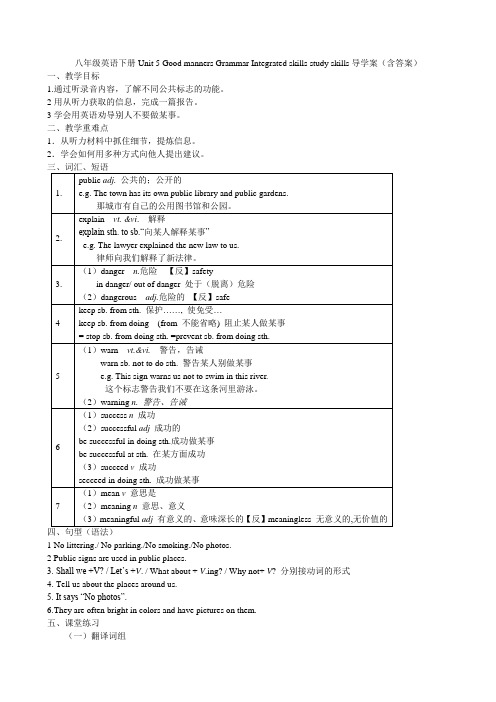
八年级英语下册Unit 5 Good manners Grammar Integrated skills study skills导学案(含答案)一、教学目标1.通过听录音内容,了解不同公共标志的功能。
2用从听力获取的信息,完成一篇报告。
3学会用英语劝导别人不要做某事。
二、教学重难点1.从听力材料中抓住细节,提炼信息。
2.学会如何用多种方式向他人提出建议。
四、句型(语法)1 No littering./ No parking./No smoking./No photos.2 Public signs are used in public places.3. Shall we +V? / Let’s +V. / What about + V.ing? / Why not+ V? 分别接动词的形式4. Tell us about the places around us.5. It says “No photos”.6.They are often bright in colors and have pictures on them.五、课堂练习(一)翻译词组1、不久以后______________________2、不同的公共标志________________________3、实现他的梦想__________________4、多年的辛苦工作________________________5、帮助解释事情__________________6、使我们远离危险________________________7、给我们有用的信息______________ 8、毕加索的著名油画______________________(二)单词拼写1. I can not_______ (表达) to you that how much I missed you when I was in the UK.2. Can you just keep your voice down in_______ (公共的) places?3. The teacher is patient enough to_______ (解释) this maths problem to us again and again.4. The police_______ (警告) the man of the danger of jogging alone before he went into the mountain.5. I hate people who_______ (乱扔垃圾) in the forest.6. I'm sure to visit you_______ (某时) next year. Don't feel sad now.7. She_______ (冒险做) her own life to help this old man out of trouble.8. Old people always say "The early bird catches the_______ (虫)".9. "No_______ (疼痛), no_______ (收获)" means you have to work hard before you realize your dream.10. To our surprise, the results are always strange_______ (真正地).11. _______ (停车) is always very expensive in the city centre.12. There was a lot of_______ (讨论) about this report on people's lives in cities.13. You need more social _______ (实践) before you get a job.14. -To be a _______ businessman is not easy, Mike. Have you thought it clearly?-Yes, Mum. I want to have my own business and I'll try my best.15. -Blow out the _______ and make a wish, Angela.-OK. Thanks for buying this cake for me.16. -Safety comes first. Remember to _______ yourself away from danger.-We will, father.(三)动词填空1. The jogging_______ (take) place on South Hill next Sunday.2. I get a letter from my father. I_______ (not hear) from him for 2 months.3. I warned her_______ (not go) near the tigers, but she didn't listen to me.4. People in the house made a fire_______ (get) warm.5. Tom said he_______ (drive) home when suddenly the man rushed out.6. Reading newspaper_______ (help) us learn about the news both at home and abroad7. So far, we_______ (raise) millions of dollars for the students in poor areas.8. How heavily it_______ (rain)! We have to stay at home today.(四)单项填空( ) 1. You must _______ me the reason why you came so late this time.A. excuseB. explainC. explain toD. pardon( ) 2. -Excuse me, look at the sigh NO PHOTOS! -Oh, sorry. I _______ it.A. don't seeB. didn't seeC. haven't seenD. won’t see( ) 3. The sign means " _______ ", so you can't park your new Porsche here.A. No parkingB. No right turnC. You can't turn leftD. No entry( ) 4. The problem is _______ hard for me _______ work out.A. enough; to B enough; that I can't C. very; to D. too; to( ) 5. J. K. Rowling is a _______ writer. Her book Harry Potter is a great _______.A. success; successful.B. successful; successC. successfully; successD. successful; successfully( ) 6. We should try to keep _______ from danger.A. us safeB. ourselves safetyC. us safetyD. ourselves safe( ) 7. -What do you think of the speech?-I think it's _______, but Tom thinks it's much too _______ .A. wonderful enough; boredB. enough wonderful; boringC. wonderful enough; boringD. enough wonderful; bored( ) 8. More and more people all over the world will realize the importance of protecting the environment _______ in the future. Which one is WRONG?A.some timeB. sometimeC. sometimesD. some day(五)完形填空If you want to get the most out of the study of a language, you must read pleasing novels, plays, travel books, 1 .And in reading books of this kind, the important thing is to take up the reading to try 2 what the writer is going to 3 you in the book as a whole. This is impossible if you stop and think over the meaning of every word which 4 to be unfamiliar(不熟悉的).You can not enjoy a story, if you stop 5 times on every page to look up words in the dictionary. You may 6 prevent yourself from understanding the story as a 7by doing this. When you are reading books of this kind, you 8 have to depend mainly on(主要依靠)the context to help you. If you meet an unknown word, don't let it draw(吸引)too much of your attention 9 the main story. Maybe you will meet the same word again a few pages later in a different context, and each time you see it, your understanding of it will become 10 exact.( )1.A. and else B. and the other C. and so on D. and those( )2.A. to understand B. to follow C. to see D. to hold( )3.A. speak B. say C. tell D. talk( )4.A. happen B. happens C. happening D. happened( )5.A. a great deal of B. much C. many D. the number of( )6.A. too B. and C. only D. even( )7.A. all B. whole C. both D. total( )8.A. usually B. seldom C. never D. no( )9.A. of B. from C. without D. at( )10.A. much B. more C. most D. less(六)阅读理解When Mark first arrived in Thailand, he saw an old man selling something cheap in the street of Chiang Mai. The old man was one of the poor people in Chiang Mai and there was no difference from beggars(乞丐). Most of them were some lonely old people. Their life had no support.Mark was a kind man, so he gave some changes to him without thinking. The old man told him to pick something he liked. Mark didn't choose anything and left.But the old man followed him closely. At first, Mark didn't think a lot, just thinking he wanted to go home. But when he went out very far, he saw the old man still following him. He was a bit tired, thinking the old man must feel he was kind and wanted to ask for more money from him.Mark turned back and told him not to follow him because he didn’t have much money. But the old man seemed not to understand what he meant, still following him. The bag on his back made him sweat (流汗) all over.Mark happened to meet his Thai colleague (同事) in the street and his colleague heard this. The colleague turned to ask why the old man was following his friend.The old man said out of breath, "My son, you gave me money, but didn't want my things, so I have to give you something. I see you are a foreigner and you are not familiar(熟悉) with this place. I just want to follow you and show you the way. All I can do for you is this."Mark was surprised. He said he felt the old man was just like his father, but he didn't know why.( ) 1. What did Mark do when he first found the old man following him?A. He didn't think a lot and went on walking.B. He asked the old man why he was following him.C. He was surprised and asked his colleague to come.D. He gave him more money without thinking.( ) 2. Which of the following is true according to the passage?A. Mark didn't like this old man at all.B. The old man was Mark's father.C. The old man sold something cheap to make a living.D. Mark didn't give the old man anything at the beginning.( ) 3. How did Mark feel about the old man at last?A. He felt doubt(怀疑) if the old man was a thief (小偷).B. He felt pity for the old man.C. He felt angry with the old manD. He felt the old man was kind and warm.(七)翻译句子1.公共标志是用于公共场所来警示人们有危险。
鲁教版八年级英语上册unit1 Intergrated Skills 教案
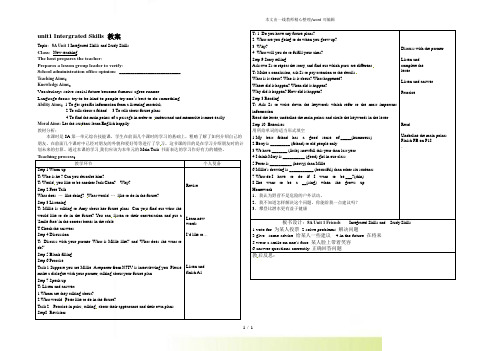
本文由一线教师精心整理/word 可编辑1 / 1unit1 Intergrated Skills 教案Topic :8A Unit 1 Integrated Skills and Study Skills Class :New teachingThe host prepares the teacher :Prepares a lesson group leader to verify :School administration office opinion :____________________________ Teaching Aims : Knowledge Aims :Vocabulary: solve social future become famous agree runnerLanguage focus: try to be kind to people try one ’s best to do somethingAbility Aims :1.To get specific information from a listening material;2.To talk about a friend.3.To talk about future plans4.To find the main points of a passage in order to understand and memorize it more easily.Moral Aims: Let the stu dents learn English happily. 教材分析:本课时是8A 第一单元综合技能课,学生在前面几个课时的学习的基础上,粗略了解了如何介绍自己的朋友。
在前面几个课时中已经对朋友的外貌和爱好等等进行了学习。
这节课的目的是在学习介绍朋友时的计划未来的打算。
通过本课的学习,我们应该为本单元的Main Task 书面表达的学习作好有力的铺垫。
Unit3AdayoutIntegratedskillsStudyskills(教案)

Unit 3 A day outIntegrated skills&Study skills设计说明首先通过一些问题和与同学们的对话来导入有关篮球比赛的海报内容,在学习新单词后完成课本中的听力内容,在此过程中,对于听力训练给出指导意见,由此练习。
通过Speak up的对话,学会向他人提出建议,并对答语给出一定的总结。
通过对Reading部分的课文的复习来导入,名词构成形容词的后缀-ful和-less,学会在语境中使用合适的形容词,用正确的后缀表明肯定或否定的意思。
最后通过练习来巩固本课时的内容。
教学目标通过本单元的教学,让学生达成以下目标:1.知识目标掌握词汇:final, support,cheer,reach, cost, half-time, rest, free, take place, cheer for, get on, helpless, useful, useless, hope, meaning, taste, cheerful, colourful, ticket, keep2.能力目标(1)学会从海报中获取有用信息,通过听力训练获取阳光中学篮球决赛的具体信息,学会向他人提出建议。
(2)了解名词构成形容词的后缀-ful和-less,学会在语境中使用合适的形容词,用正确的后缀表明肯定或否定的意思。
3.情感目标了解海报的制作包含的几大要素,通过活动培养学生的集体荣誉感。
重点难点重点:To understand specific information by reading and listening难点:To infer general meaning from context and keywords.教学准备PPT课件;相关图片授课时数1课时教学过程Step 1 Lead-in1. Show some questions :Do you like some outdoor activities?What outdoor activity do you like?Do you always watch some matches about it?When and where do you play it?Ask the students to answer the questions.2. Watch a video about afinal of abasketball competition, ask students to know about the basketball final.Step 2 Presentation1. Show them some pictures and present the new words.2. Ask them to read the words more than three times and try to remember the words.Step 3 Pre-listening1. Show them some listening tips①做听力之前,快速浏览所给的听力材料并整理出要听的重点。
牛津译林版九年级英语上册 一单元Integrated skills and Study skills

In Western countries, a year is divided into a cycle of (4)__1_2_ star signs. Your star sign depends on your (5)_d_a_t_e_o_f_b_ir_t_h__. Some people believe that your (6)_s_t_a_r_s_ig_n_ may decide your personality.
What personality does he have?
wise, practical, powerful, loyal, organized, humorous
Xi’s profile
born in 1953 the Year of the Snake
the Year of the Sheep
1.Lively 生动的,活泼的, 充满活力的
live--lively--living—alive The boy was still living/alive. He was the only person alive. She is a lively girl.(形容词,活泼的) There are no living things on the moon.(形容词,活着的,修饰 名词放在名词前面) Many animals live in the wild.(动词,居住)
WESTERN STAR SIGNS Star signs: a cycle of (7)__1_2_ star signs Your star sign: depends on your (8)_d_a_t_e_o_f_b_i_rt_h_ Some people believe that your star sign may decide your personality.
Unit2IntegratedskillsStudyskills学案牛津译林版英语九年级上册

Unit 2 Integrated skills【学习目标】1.能够背诵本课时的重点单词和句型。
2.能从广告和听力材料中获取信息,完成相关任务。
3.能正确运用跳读(scanning)的阅读技巧。
【预习导学】一、词汇记忆1.治疗;疗法2.发现3.十几岁4.承诺5.从事6.紧张的7.建议8.宁愿9.根据10.取回,要回二、预习课文,翻译下列句子1.Mrs Rainbow发现颜色能改变我们的心情,改善我们的生活。
Mrs Rainbow colours canour and our .2.来看看这些衣服是否适合我。
Come and see these clothes look me.3.你穿橙色看起来挺精神的。
You look orange.三、想一想对比上单元和本单元的阅读技巧。
阅读技巧相同点不同点Skimming (略读)都是一种阅读技巧,都有快速浏览的含义侧重抓住文章的Scanning(跳读)侧重了解文章的,有针对性地寻找答案【答案】一、词汇记忆1.therapy2.discover3.teens4.promise5.practise6.stressed7.suggest8.would rather9.according to10.get back二、预习课文,翻译下列句子1.finds change moods improve lives2.if good on3.smart in三、想一想主旨和大意细节【合作探究】任务驱动一听力训练1.阅读教材A1中广告信息,回答下列问题。
(1)What can colours do according to Mrs Rainbow's colour therapy?______________________________________________________________ (2)How much should you pay if you watch this show for an hour?______________________________________________________________ (3)What can we do if this therapy can't change our moods?______________________________________________________________ 2.听教材B的录音,回答下列问题。
Unit2 Integrated skills and study skills精品教案

Unit2Integratedsillsandstudysills精品教案教学目标:基础知识掌握词汇:tabletennis,else,lot,fun词组:alotof=lotsof句型:Whatelsedoyoulietodo基本技能1从听力材料中获取信息,用所得信息将语篇补充完整。
2了解五个元音字母在重读闭音节中的发音,能准确朗读含有五个元音字母的重读闭音节单词。
3运用本课所学的读音规则,准确朗读新单词。
综合素质就相关话题进行交流,谈论喜欢的活动,激发热爱运动,热爱生活的积极生活态度。
教学重难点及突破重点:掌握基本的四会单词、词组及句型。
难点:了解五个元音字母在重读闭音节中的发音,能准确朗读含有五个元音字母的重读闭音节单词。
教学突破:将本单元的读音规则与第一单元进行比较,让学生自己体会差异,总结规律,有助于理解和记忆。
教学准备教师准备:多媒体课件学生准备:复习五个元音字母在重读开音节中的发音。
教学设计Ste an/æ/,city,sit/i/dog,not,job/ɔ/duc,sun,luc/ʌ/underthecorrectsoundgrouoreaeacae,aredaehisname,goho me,lucystudents,alongnose,Whatalovelyfacehemaes!IhavealittlerobotandhisnameisJacIwillyhatAboygoesontothestageLet’sgobactothesan,maad/e/des,egg,,sit,with,file,bill,ris,sil/ɒ/bo,dog,long,not,stoum,gun,just,luc随堂小练习选出下列每组词中划线部分发音不同于其他单词的一项。
记忆本课时的词汇、短语和句型;的对话,有能力的学生仿写一段对话;3从本册书中的生词表里,找出符合元音字母在重读闭音节中的发音规则的单词,每一类写五个单词。
Let's play sports Integrated skills and study 教案

Unit 2 Integrated skillsAims:1. Practise listening skills by listen to a conversation.2. Practise speaking skills by talking about after-school activities. Step 1. PresentationPresent the new words: table tennis, else, a lot of , funStep 2. Lead-inEnjoy a video, then ask the Ss: What’s your favourite sports?Step 3. Listening1. Listen to a conversation and complete A1 on page 25.2. Listen to the conversation again and complete A 2.Step 4. Speak-up1. Listen to the conversation and complete the form2. Read the conversation after the recorder.3. Talk about your after-school activities like this.Step 5. Explain1. after school 放学后after class 下课后after work 下班后2. else adj. & adv. 别的,其他的(总是置于被修饰词后面)e.g. What else do you want to say?你还想说什么?Is there anything else to eat?还有别的东西吃吗?3. make sb. do sth. 使某人做某事e.g. Jack often makes us laugh.杰克常逗我们乐。
- 1、下载文档前请自行甄别文档内容的完整性,平台不提供额外的编辑、内容补充、找答案等附加服务。
- 2、"仅部分预览"的文档,不可在线预览部分如存在完整性等问题,可反馈申请退款(可完整预览的文档不适用该条件!)。
- 3、如文档侵犯您的权益,请联系客服反馈,我们会尽快为您处理(人工客服工作时间:9:00-18:30)。
Unit4 Finding your way
In tegrated skills and Study skills
aims and demands:
Key points:1. 识别有关方向的表达方式。
2. 学会使用指示语中的关键信息,并能在听力中获取相关信息的特定顺序。
3. 学会读出句子的升调和降调。
Te aching methods: task-based approach
Teaching procedures:
Ⅰ. Warm-up
Ask the student on duty to give a short talk.
Integrated skills
Ⅱ.Finding treasure
the Ss to study the pictures in Part 1 carefully. Put a tick in the correct boxes. Check the answers and explain.
to the ta pe and tell the Ss t o do the Exx on Page48and 49. Listen again if necessary. Check the answers with the whole class.
Ⅲ. Speak up
to the tape recording and read after it.
the Ss to work in pairs to make up a new conversation for giving direction using the conversation in Part B as a model. Ask a few pairs to present their conversations to the whole class.
Ⅶ. Study skills
How to read correct falling voice and rising voice
如何读出正确的降调和升调
英语的语调总的特点是:全句的调子一般都是由高逐渐降低,语调主要表现在句末,升调和降调通常分别用“↗”和“↘”来表示。
(1)升调
升调常用来表示不肯定,语意未完,或表示礼貌,常有含蓄、委婉、安慰、虚心征求意见等意味。
升调的用法可归纳为以下五种情况:
①一般疑问句通常用升调。
Is he `making a ↗kite?
Are they `cleaning the ↗classroom?
②数数、列举事物或列举一连串的动作时,除最后那个并列成分用降调外,前面所有的并列成分都要用升调。
`Let’s `count our `new ↘books. ↗One, ↗two, ↗three, ↗four, ↘five. `Oh, we have ↘five new books.
③选择疑问句的语调分为两个部分,or前的部分用升调,or后的部分用降调,记成“前升后降”。
Is her `answer ↗right or ↘wrong?
④反意疑问句的语调也得分两种情况:若说话者对所陈述的内容没有把握,想询问对方这一廉洁是否正确,则陈述句部分用降调,简略问句用升调;若说话者对所陈述的内容已经很有把握,只是想要对方同意自己的观点,或是想从对方那里得到证实,则前后两部分都用降调。
--Your `uncle is ↘tall, ↗isn’t he? --↘No, he’s very ↘short.
You `like ↘apples, ↗don’t you?
⑤含状语从句的复合句的语调也要分两种情况:若主句在前,从句在后,主句结束时意思已比较完整,则通常用降调,整个句子读完时也应该用降调;但是,若从句在前,主句在后,则常常是“前升后降”。
I was `drawing a ↘picture when my `mother `came ↘back.
`When she `got to the ↗station, the `train had `already ↘left.
(2)降调
在英语句子中,降调的使用比升调更为广泛,它表示肯定、决断、坚决或终结,但有时含有生硬、不容质疑的意味。
降调的用法可归纳为以下七种:
①陈述句用降调:
`Lucy is `cleaning her ↘bedroom.
②特殊疑问句也用降调:
`Whose is `this ↘coat?
③表示命令的祈使句也常用降调:
`David, `open the ↘door.
④问候用语常用降调,以示真诚:
Good ↘morning.
⑤感谢用语也常用降调,以表示诚挚的谢意:
↘Thank you.
⑥感叹句用降调:
What a ↘lovely day!
⑦在并列句中,并列连词and, but, or等的前后两上分句都用降调:
We `come to `school by ↘bus and he `comes by ↘bike.
(3)特殊语调现象
在日常口语中,人们除了使用规范的语调外,还经常灵活地运用语调,以表达自己的不同态度、感情、情绪、意图以及隐含意义。
①不同语调的“yes”
↘Yes. (降调表示同意对方的观点)
↗Yes?(升调表示疑问,意为“真的吗?”或“是吗?”。
若在回答对方的呼唤时使用,则意为“什么事?”或者“怎么啦?”)
②两种味道的“all right”
`All ↗right.(升调,正常的语调,意为“好吧”)
`All ↘right! You `shall re`pent ↘this.(降调,带有威胁的口气,意为“好!以后不要懊悔!”)
③两种味儿的感谢用语
↘Thank you.(降调,表示真诚的感谢。
)
↗Thank you.(升调,出于礼貌而说的客气话。
)
④你喜欢哪种问候?
Good ↘morning.(降调,此乃真诚的问候)
Good ↗morning.(升调,这是较熟的朋友之间漫不经心的问候)
⑤特殊疑问句用升调表示亲切、礼貌、友好和关切。
`What is your ↗name?
`What can I ↗do for you?
⑥祈使句用升调表示委婉客气的请求。
`Come `in and `have a `cup of `tea, ↗please.
⑦陈述句用升调表示疑问、抱歉或含蓄的隐含意义。
You have a new ↗watch!
I `don’t `think ↗so.(句意为“我不这样认为”,但隐含意义却为“我把握不大”。
)Language points:
the brid ge and turn right
the second turning on the right.
along a path.
Ⅷ. Sum-up
Go through the new words and the language points learnt during this lesson. Ⅸ. Homework
1. Review the contents of this lesson.
2. Do the Exx of the workbook.
教后记:。
